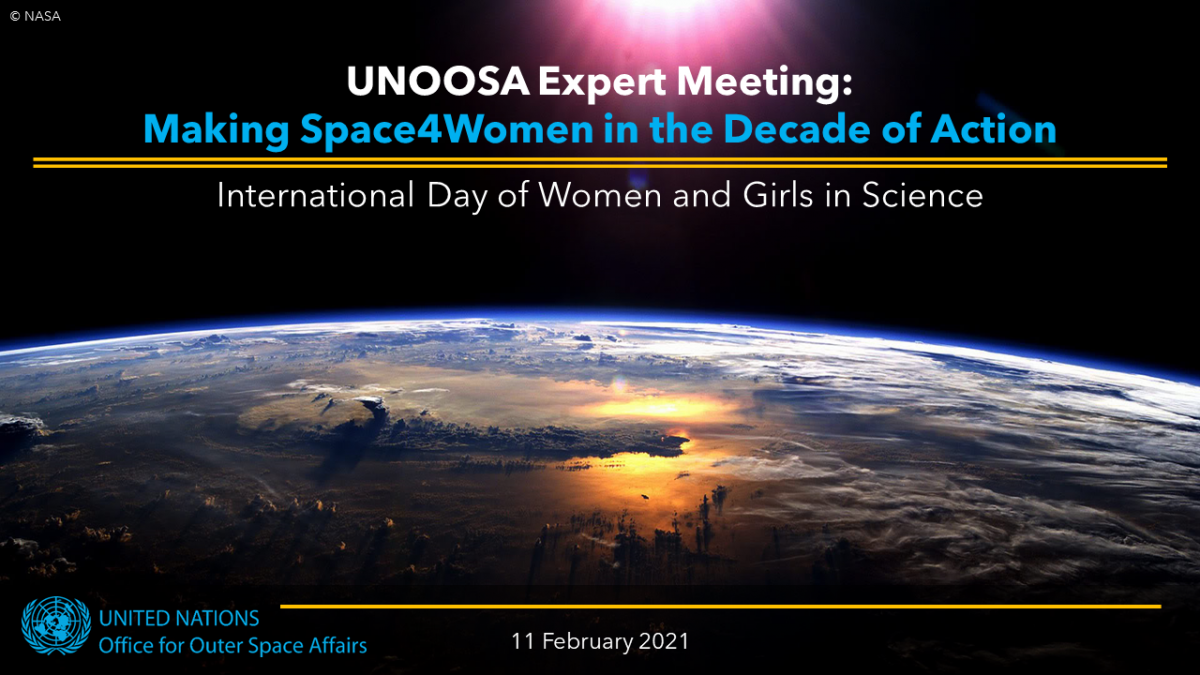Summary: The Annual Space4Women Expert Meeting

February 11th marked the International Day of Women and Girls in Science. UNOOSA Space4Women celebrated the day by bringing together the Space4Women mentors and dozens of participants worldwide to the annual Space4Women Expert Meeting. UNOOSA Director Simonetta Di Pippo opened the day's sessions, emphasizing the critical role of women and girls in the space community and reaffirmed UNOOSA's commitment to strengthening female participation in the sciences. During the meeting, the mentors shared their insights and initiatives before discussing questions put forward by participants on issues and solutions relating to gender equality in space and STEM. Here is a summary of key points across each thematic segment.
Thematic Segment 1: Space4Women in its second year and beyond: Lessons learned and future directions.
Key Takeaways and Observations
- The ongoing COVID-19 pandemic has been a significant enabler for moving activities online, with many audiences growing. COVID-19 has shown us that not everyone needs to live in a certain place. You can be anywhere and still do your job. Having a robust workforce and making kids have the skills they need to use technologies are important. However, the global digital divide remains a challenge, and engaging with students and schools is more difficult than usual.
- Female treatment is peculiar, given that babies are raised and educated by women. Yet, the final product is people who may feel superior or not feel included in society. Gender disparity may need to be reframed and approached with more comprehensive action.
Thematic Segment 2: Space for women and women for space: Implications of rapid and emerging technologies.
Key Takeaways and Observations
- Space is an extremely powerful tool in providing access and international cooperation and enabling the projection of people into something much larger than themselves. However, noticeable inequalities have also grown, requiring extra effort toward granting access to all technologies allowing us to stay connected.
- Opportunities to collaborate in CubeSat design, which are much more affordable now, have led to coming missions with extraordinary scientific outcomes.
- Remote sensing technology brought space to everyone’s computers. The key is to make space and science a hands-on experience that is memorable and enjoyable. Many tools are already available, such as Google Earth, Google Mars, and Google Moon. As technology continues to grow, we need to look at reskilling people accordingly.
Thematic Segment 3: Addressing the pipeline problem: Inclusion and equity in space and STEM education and the workforce.
Key Takeaways and Observations
- The situation is getting worse in the gender divide, where there is an observed reduction of women getting into STEM subjects. Addressing stereotypes begins at home in the family and schools. There are ways to make STEM subjects, such as mathematics, inclusive and fun for girls.
- ESA recently announced a new astronaut selection campaign. The challenge has been a narrative of space where it remains accessible to only a select few. There is an expectation now for a more extensive response from females, and a path is being paved for people with disabilities.
- There is a need to open the door of the gender divide, but the approach is more of an individual process for retention. Gathering diversity metrics and introducing anti-bias training is part of the solution. Nurturing a sense of belonging and helping others have a piece of the future in space is vital.
- There is a need to revolutionize schools. However, institutions and schools are often overloaded with challenges. Instating clear policies that enable career progression is critical, particularly during the pandemic where it is difficult to have scientific output.
- Focus on addressing how kids are exposed to STEM early on, as it becomes much harder to revert later on in life. Purposeful, context-based learning must be implemented. Women should lead the charge for change alongside men.
- An emphasis on the importance of gender aggregated data and evidence-based research for future success metrics and the need to translate data into actionable tasks as we move into the Decade of Action.
We thank each mentor and attendee for their participation, and we appreciate your enduring support in the future. For those who missed the Expert Meeting or participants who would like to revisit the conversations, you can watch the full recording here.

